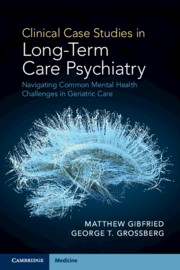 Clinical Case Studies in Long-Term Care Psychiatry
Clinical Case Studies in Long-Term Care Psychiatry Catatonia
Published online by Cambridge University Press: 31 October 2024
Catatonia is a severe neuropsychiatric condition characterized by a state of immobility, stupor, and unresponsiveness to the environment. Signs and symptoms can be thought of in terms of motor signs, affective features, and cognitive-behavioral features. Common symptoms of catatonia can include stupor, rigidity, posturing, mutism, or prolonged excitement and agitation. Benzodiazepines and electroconvulsive therapy are the most commonlly used treatments for catatonia. Both treatments have shown similar efficacy.
To save this book to your Kindle, first ensure [email protected] is added to your Approved Personal Document E-mail List under your Personal Document Settings on the Manage Your Content and Devices page of your Amazon account. Then enter the ‘name’ part of your Kindle email address below. Find out more about saving to your Kindle.
Note you can select to save to either the @free.kindle.com or @kindle.com variations. ‘@free.kindle.com’ emails are free but can only be saved to your device when it is connected to wi-fi. ‘@kindle.com’ emails can be delivered even when you are not connected to wi-fi, but note that service fees apply.
Find out more about the Kindle Personal Document Service.
To save content items to your account, please confirm that you agree to abide by our usage policies. If this is the first time you use this feature, you will be asked to authorise Cambridge Core to connect with your account. Find out more about saving content to Dropbox.
To save content items to your account, please confirm that you agree to abide by our usage policies. If this is the first time you use this feature, you will be asked to authorise Cambridge Core to connect with your account. Find out more about saving content to Google Drive.